News

The bwCard portal for the KIT Card gives user groups centralized, user-friendly access to all relevant functions and information relating to their KIT Card and allows them to benefit from improved self-service.
With the new bwCard portal, students, employees, guests and partners now have access to a modern online service that provides central services related to the KIT Card in a bundled and convenient way. The portal enables transparent and efficient administration of personal cards.
In the bwCard portal, users can view the card data of their KIT Cards and display the personal data stored in the card management system. If a KIT Card is lost, it can be blocked quickly and easily to prevent misuse.
The bwCard portal also supports the production of new KIT Cards: For this purpose, portrait images can be uploaded, the issuing campus can be specified and the status of newly produced cards can be viewed. A QR code and the respective collection date are available for collection. In individual cases, it is also possible to activate KIT cards via the portal.
With the bwCard portal, KIT is expanding its digital service offering and providing a central, user-friendly platform for managing the KIT Card.
Further information on the bwCard portal can be found in the service description.
Gabriele Schramm

The WOW project is developing an AI world model that links models for global climate change with data from local environmental impacts. The aim is a more precise and faster assessment of climate risks and the planning of adaptation strategies.
At SCC, Charlotte Debus, research group leader of the Junior Research Group Robust and Efficient AI (RAI), and Markus Götz, head of the Helmholtz AI Consulting group for energy topics, are launching the project WOW - "World model of Our World" - together with researchers from KIT institutes for Earth System Science, Climate Science, Computer Science and Robotics (ITI, IWU, IPF, IAR, IMKASF, IMKTRO and IMKIFU (IMK)).
This is a unique AI-based "world model" that links global climate change with local environmental impacts such as forest fires, floods and droughts. WOW was awarded the prestigious Carl Zeiss Foundation Breakthroughs Grant worth six million euros.
Markus Götz will oversee the development of joint latent representations between AI models for atmospheric, hydrological and land surface extremes. These are low-dimensional data embeddings that capture common structures across different data modalities. They enable interaction across different spatial and temporal scales and help scientists to recognize how changes in one part of the Earth system affect other parts.
This innovative coupling promises faster, more accurate and more energy-efficient simulations than conventional physics-based models. This research is being evaluated under the leadership of Charlotte Debus, whose research focuses on scalable, efficient AI and uncertainty quantification in energy informatics. In the long term, the technology could provide high-resolution climate and environmental information to support climate risk assessment and adaptation planning.
In addition, Mishal Benz, Helmholtz AI Consultant at the SCC, is responsible for science management tasks in the WoW project, with a focus on science communication and public relations. This task includes developing strategies to make both the scientific progress and the milestones of the project transparent and to provide communication support in order to increase its impact and reach.
Further information in the KIT press release
Contact at the SCC: Dr. Charlotte Debus, Dr. Markus Götz
Achim Grindler

Since the beginning of December 2025, the SCC has been operating the central login and rights management platform NHR Community AAI (CAAI) of the Association for National High Performance Computing (NHR)
The NHR Community AAI - based on the CAAI software RegApp developed at KIT - allows users of NHR resources to log in to the NHR services using their home institution's own account. The implementation was carried out together with the HPC and IDM teams at the IT Center of RWTH Aachen University, where the project lifecycle tool "JARDS" for NHR is also operated. In the first step, JARDS will be connected to the single sign-on infrastructure so that local accounts no longer need to be managed. In future, users will be able to log in with the access data of their home institution, via ORCID or other social accounts and seamlessly access connected services after a single login. The Community AAI offers project managers centralized and secure management of projects, roles and access.
The portal can be accessed at login.nhr-verein.de and is operated as a client of the Karlsruhe RegApp infrastructure.
What is a Community AAI?A Community AAI (Authentication and Authorization Infrastructure) is the joint login and rights management platform of a specialist or project community. It bundles identities from different sources (e.g. home institutions, ORCID, guest or social accounts) and provides uniform, secure access to the services of the community. RegApp is a CAAI software that has been developed at the SCC for more than 15 years and is operated jointly for various federations (e.g. bwIDM, NFDI, NHR).
What does a CAAI doUniform login (single sign-on): Login with the account of the home institution, ORCID or other approved identity sources; log in once, use multiple services.Federation and mediation: Connection of many identity providers and services via standards such as SAML and OpenID Connect; optional integration via eduGAIN.Identity consolidation: Linking multiple accounts of one person, assigning stable identifiers and managing the level of assurance.Authorization and roles: Central administration of roles, groups, projects and authorizations (entitlements) for access to applications and resources.Lifecycle management: Onboarding, verification (e.g. by e-mail), assignment to projects, automatic provisioning/deprovisioning of access and resources at the start, change or end of a project.Security and compliance: Support for multi-factor authentication (if available at the respective IdP), consent and attribute release management, logging and auditing, data-saving attribute transfer.Service integration: Standardized interfaces and processes for onboarding new services, central attribute provisioning and policy enforcement.Self-service and operation: User and project self-service (e.g. profile, account linking, invitations), helpdesk support and highly available, scalable operating processes.What added value does a CAAI offerA Community AAI creates added value for everyone: users receive fast and uniform access to all connected services with a single login instead of multiple passwords; service providers reduce integration effort, benefit from consistent identity attributes and centralized security and consent processes; administration and community benefit from transparent role and project control, automated provisioning and deprovisioning, traceable audits and better compliance.
Ulrich Weiß

If you have not yet taken part in our 2025 user survey, you can still get started now. The survey will still be open in January 2026.
Dear colleagues,
About 5 weeks ago you received an e-mail with the access link to the SCC user survey. More than 1,000 people have already taken part in the survey - thank you very much.
If you have not yet taken part in our 2025 user survey, we look forward to receiving your valuable feedback.
Take advantage of this opportunity until the end of January 2026, as your opinion will help us to improve our IT services and shape our IT services portfolio.
To the SCC user survey 2025
Achim Grindler

20 years of WLCG: The worldwide grid infrastructure that made the discovery of the Higgs boson possible celebrated its anniversary – and SCC has been part of it with GridKa since the very beginning.
On 8. December 2025, 20 years of the Worldwide LHC Computing Grid (WLCG) were celebrated at CERN with a festive workshop. WLCG is the federated IT-infrastructure that transforms the massive amounts of data of the LHC experiments into scientific knowledge and impact. WLCG was a major part of the success of finding the Higgs-Boson in 2012, which resulted in the physics Nobel Prize a year later. We at SCC are part of WLCG with the Grid Computing Centre Karlsruhe (GridKa), the German Tier-1 data center, since the beginning.
The program of the workshop comprised presentations from the early founding fathers, e.g., Leslie Robertson (CERN retired), Simon Lin (ASGC Taiwan, retired) and Fabrizio Gagliardi (ex-CERN, retired) showing impressive insides and historic slides how everything started. A view into the future was given by Mark Thomson (CERN Director-General Designate) and Karl Jakobs (University of Freiburg and Chairman of the European Strategy for Particle Physics Group).
All presentations are available on the event page:
Achim Streit

The IHK Karlsruhe honors top performance in training and further education. Our apprentice, Alan Askarov, was awarded a "Best of the Year Certificate" for his outstanding achievements in the Fachinformatiker/System Integration apprenticeship.
At the IHK Karlsruhe's annual award ceremony on November 19, 2025 in the Badnerlandhalle in Rastatt, 211 graduates from all IHK professions were honored for their outstanding achievements in training and further education. The trainees were invited together with their families and trainers as well as representatives from business and politics.
Among those honored was Alan Askarov, a trainee at SCC, who was recognized for his outstanding achievements in the Fachinformatiker/Systemintegration apprenticeship. Alan became familiar with many departments at SCC during his training, which allowed him to build a broad foundation of IT expertise. For most of his apprenticeship, he worked in the Exchange team, where he provided extensive support in administering and maintaining the Microsoft Exchange mail server environment.
It was a particularly moving moment for the trainees to be called up by name to be honored and to receive their certificates on stage with their trainers. The IHK Karlsruhe would like to thank not only the award winners, but also their families, trainers and the companies and educational institutions that have supported them (see IHK press release (german)).
SCC would like to congratulate Alan Askarov on this great success and wishes him all the best for his future career. We extend our sincere thanks to our trainer Michael Willhauk and to all dedicated colleagues who contribute to the success of our trainees at SCC.
Achim Grindler

SCC has relocated and expanded the central tape library of the Tier-1 data center GridKa to a new site. The system provides around 300 petabytes of storage capacity for CERN data and ranks among the largest installations in Europe.
At SCC, the central tape library of the Tier-1 data center GridKa has been relocated to a new site and fully commissioned in recent days. The tape library is a core component of the storage infrastructure for data from the experiments at the Large Hadron Collider (CERN) and plays a crucial role in the long-term archiving and safeguarding of this research data.
The magnetic tape system from Spectra Logic spans almost 13 meters in length, making it one of the largest tape libraries in Europe. It features two tape robots and 48 tape drives for data transfer. In total, around 14,900 cartridges were sorted into the shelves using special transport modules, so-called “Terapacks”. With this configuration, the system achieves a theoretical storage capacity of nearly 300 petabytes.
Beyond its enormous capacity, tape technology stands out for its energy efficiency: operating the entire library requires only 1.5 to 3 kilowatts of power—comparable to an industrial vacuum cleaner. This makes the solution significantly more economical than disk-based systems, which demand not only more energy but also higher cooling performance for long-term storage of large data volumes. While access times for magnetic tape are considerably longer, once a tape is mounted, the transfer rate matches that of high-performance hard drives.
With the successful relocation and expansion of the tape library, SCC strengthens the capabilities of the GridKa data center and ensures the reliable storage of research data for the international scientific community.
Achim Grindler

With the delivery of the first racks, the installation of the new supercomputer HoreKa 2 has begun. Starting in early 2026, it will provide researchers with additional computing capacity and set new standards in efficiency and energy consumption.
Work on KIT's new supercomputer HoreKa 2 began a few weeks ago with the delivery of the first racks. As the successor to the Karlsruhe supercomputer (HoreKa), which will go into operation in 2021, the system will provide researchers with additional computing capacity. The aim of this new computing cluster is to meet the constantly growing demands for computing power and data processing in science.
The new infrastructure relies on modern, highly efficient components to ensure maximum performance with optimum energy efficiency.
Lenovo SD665 V3 systems with the latest "AMD Turin" technology are used in the CPU partition. All components are supplied by a complete warm water cooling system, which enables maximum density and efficiency.
The GPU partition is based on the Lenovo ThinkSystem SC777 V4, which combines ARM-based, NVLink-connected NVIDIA Grace CPUs and NVIDIA Blackwell GPUs in one compute tray. This is currently the most powerful platform for GPU and AI applications. Here too, the "Lenovo Neptune" liquid cooling technology ensures complete direct warm water cooling of all components.
The storage system is built with IBM Storage Scale Systems (SSS 6000) with a two-tier architecture of NVMe and HDD tiers. This NVIDIA-certified high-performance solution forms the basis for HPC and AI infrastructure on NVIDIA Grace Blackwell systems and thus promotes the next generation of data-driven research and innovation.
The management systems are also water-cooled with Lenovo's Neptune Core (OpenLoop) technology, where technically possible, to ensure a consistently sustainable and efficient overall system.
Thanks to numerous water-cooled components, the new supercomputer sets new standards in terms of efficiency and energy consumption. Up to 99% of the heat generated is dissipated directly into the warm water, which enables highly efficient cooling throughout the year. The waste heat generated is used to heat the buildings on site.
The construction of HoreKa 2 is divided into two phases:
Phase I comprises the installation of the storage and CPU units and should be completed by the end of this year. User operation is scheduled to start at the beginning of 2026.
Phase II will see the installation of the GPU units and the transition to full operation with full system performance in the coming year.
In addition to the installation of the new, more powerful system, the computer room will also be extensively modernized. The building constructed in 2016 for the high-performance research computer II will thus be fit for the future.
Contact at SCC: Dr.-Ing. Samuel Braun
Achim Grindler

The KI-Toolbox developed as part of the strategic fund project GenAI@KIT is now available to all KIT employees
The KI-Toolbox is based on Open WebUI and provides KIT employees with a convenient, web-based interface for intuitive use of generative artificial intelligence (AI). The Toolbox integrates various large language models (LLMs).
Currently, three locally hosted models are available, offering maximum data protection sovereignty and operated exclusively by the SCC. In addition, models via Azure OpenAI are available for general-purpose tasks – without personal data inference and without using input data for model training. All costs are covered by project funding.
In addition to the web interface, the AI Toolbox also offers an API access via an OpenAI-compatible endpoint, enabling external tools to connect directly.
Access Requirements
Access to the KI-Toolbox requires a KIT account – either for employees or for guests and partners – as well as the successful completion of the AI training course on KOALA.
The KI-Toolbox is currently accessible only within the KIT network or via VPN: ki-toolbox.scc.kit.edu
Further Information
SCC service description KI-Toolbox.
Guides and webinars for using the AI Toolbox are provided by the Center for Technology-Enhanced Learning (ZML).
Information about the GenAI@KIT project and the use of generative AI at KIT is also available.
Contact at SCC: Philip Hoyer
Achim Grindler

The biblical text of the Gospel of John and its extensive medieval commentary literature are the focus of a new cooperation between SCC and the University of Regensburg.
In the project Die philosophische Rezeption der Bibel im Mittelalter und ihre Interpretation in der „longue durée“, over 60 medieval manuscripts are being extensively transcribed, edited and enriched with metadata. The project is funded by the Bavarian Ministry of Science as part of a top professorship for Prof. Dr. Julie Casteigt. The aim is not only to edit the texts and make them accessible to the general public, but also to analyze them with the help of a modular research data infrastructure and to link them with other sources of information such as standard data or manuscript catalogs.
SCC-DEM is developing a research data repository as well as specialized services for search, annotation, analysis and visualization. In this way, approaches from qualitative and quantitative research will be brought together and enriched by additional methods (see also SCC News 1/2025).
Picture credits: Paris Latin 641, Bibliothèque nationale de France, source
Danah Tonne

Successfull first of its kind Helmholtz Codes! workshop. Over 50 software authors, including members of SCC, met in Berlin to discuss research software in the Helmholtz Association.
Research Software is an important and valuable key component of modern scientific endevaours. In this spirit, authors of research software from all over Helmholtz met for the first of its kind "Helmholtz Codes!" workshop at Projektträger DLR in Berlin. The three-day workshop was jointly organised by HiRSE, HIFIS, and HIDA, and brought together over 50 code authors from all over Helmholtz, covering most of the Helmholtz research centers and research fields.
Over the course of the workshop, the attendees engaged in dynamic discussion sessions on how Helmholtz can foster innovation, collaboration, and sustainability in research software development. The following three working groups discussed ideas and developed approaches on different aspects: (1) Centralized services and support for research software within the Helmholtz Association, (2) Decentralized research software from groups and individual developers, and (3) Strategies for better connection and guidance to these services.
The workshops outcome will be distilled into an internal short position paper, summarising the key findings and recommendations. This document will be presented to Helmholtz decision-makers, aiming to shape future initiatives for research software and research software engineering within Helmholtz.
Members of SCC were involved in both the organisation of the workshop, as part of the HiRSE project, and as software authors, contributing their expertise, insights and ideas to shape the discussion and outcome of the workshop.
René Caspart

Kick-off for EOSC Federation in Brussels: At the symposium with 500 participants, the Memorandum of Understanding of the first 13 EOSC nodes was signed – with SCC contributions to EU, EUDAT and Germany nodes.
Close to 500 community stakeholders and European policy makers met at the EOSC Symposium in Brussels from 3.-5. November 2025 to discuss the future of the European Open Science Cloud (EOSC) and the federation of operative EOSC nodes. SCC operates the central EOSC helpdesk system as part of the EOSC EU node and contributes to the EOSC Node EUDAT as well as the NFDI-driven EOSC node Germany. One member of the SCC delegation at the event was even on stage at the ceremony for EUDAT (holding the “A” letter in the picture).
The first day was opened by an inspiring keynote of Robbert Dijkgraaf, President-elect of the International Science Council, former Minister of Education, Culture and Science of the Netherlands and a theoretical physicist and mathematician, on the future of European (Open) Science. The day culminated in the signing ceremony of the EOSC federation’s MoU as a shared path to operations for the 13 EOSC nodes of the first wave and the EOSC Association. The last day started with a keynote from Shelley Stall, Vice President of the American Geophysical Union (AGU) reflecting on the history of the AGU and the current situation in the US including changes in the US science policy. The audience showed their appreciation and respect with standing ovations.
Further information: eosc.eu/news/welcome-to-the-eosc-federation-mou-establishes-shared-path-to-operations/
Program including presentations: indico.cern.ch/event/1543880/timetable/?layout=room#20251103.detailed
Achim Streit

The "Code for Thought" podcast covers topics all around Research Software and Research Software Engineering. Moderated by Peter Schmidt, the latest episode covers the RSEHPC@ISC25 workshop with René Caspart and Michele Mesiti from SCC as guests.
The 9th episode of season 10 "Let Benchmarking Commence... the HPC RSE workshop at ISC 2025 in Hamburg" focuses on this year's RSE workshop at the International Supercomputing Conference in Hamburg, the annual international conference for High performance Computing, Storage, AI and more in Germany. The workshop dived into the depth of Continuous Integration and Benchmarking for High Performance Computing, covering a plethora of perspectives from operators, users and research software engineers.
Peter Schmidt, a well known RSE in the RSE community now fully devoted to podcasting, discusses with the organizers of the workshop Robert Speck (FZJ, JSC) and René Caspart (KIT, SCC), and two of the main keynote speakers Jayesh Badwaik (FZJ, JSC) and Michele Mesiti (KIT, SCC), their experience with organizing the workshop, perspectives for the topics and main take aways from the event.
The full episode of the podcast is available on buzzsprout.
Achim Grindler

Twice a year, the international LHCOPN/ONE group meets at different locations in Europe, America or Asia - the SCC hosted the meeting from October 7 to 9, 2025.
A total of 48 people took part in the hybrid meeting - 38 on site at the SCC and 10 via Zoom. The participants came from 18 countries: 28 from Europe, 14 from America, five from Asia and one from Africa.
The meeting focused on the two virtual private networks LHCOPN (LHC Optical Private Network), which has been in operation since 2005, and LHCONE (LHC Open Network Environment), which are essential components of the global data infrastructure of the Large Hadron Collider (LHC) at CERN.
LHCOPN connects CERN with 15 so-called Tier 1 centers worldwide in a star shape - including GridKa, which is operated at the SCC. The raw data from the LHC detectors is distributed via this network.
LHCONE is a much larger network, which is supported by 36 National Research and Education Networks (NRENs) and comprises around 135 centers. It is used for the further distribution and analysis of LHC experiment data at Tier 2 centers.
The agenda included the following main topics:
Status reports on LHCOPN and LHCONE
Developments at NRENs, experiments and affiliated centers
Strategies for migrating from IPv4 to IPv6 with the aim of reducing dual-stack environments
Updates from the "Network Research Technology" working group, in particular on the further development of monitoring tools
All contributions were openly discussed and enriched by the expertise of the international participants.
Contact at SCC: Bruno Hoeft
Achim Grindler
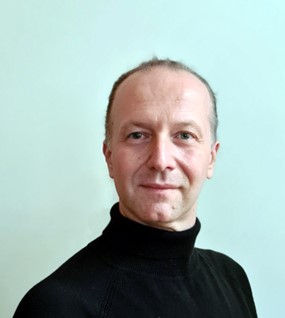
Since September 2025, Professor Luca Ghiringhelli has been leading the newly established research group Computational and Data Science in Materials Research (CDSMR). The group develops large-scale methods for realistic materials modeling.
In September 2025, Professor Luca Ghiringhelli was jointly appointed by the Scientific Computing Center (SCC) and the Faculty of Chemistry and Biosciences at KIT to the Professorship for Computational and Data Science in Materials Research. Previously, Prof. Ghiringhelli was Professor for Data-based Materials modeling at the Friedrich-Alexander-Universität (FAU) in Erlangen-Nürnberg.
At SCC, Prof. Dr. Luca Ghiringhelli leads the newly established research group Computational and Data Science in Materials Research (CDSMR), which develops novel machine-learning / artificial-intelligence, and computational statistical mechanics tools for the study of the behavior of materials functions and processes at realistic conditions, moving from their atomistic description. CDSMR also develops methods for the active learning of materials properties and functions, in order to guide via data-based and physics/chemistry-based modeling the design and discovery of better, new, and possibly novel materials.
Achim Grindler
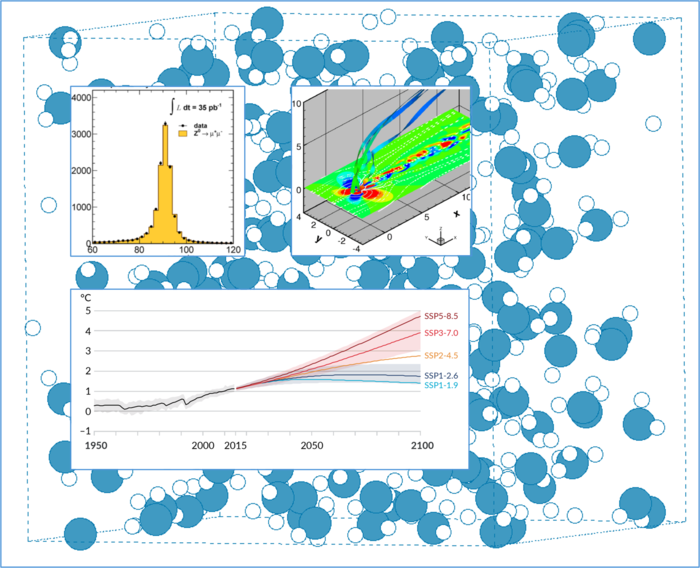
Application Phase for the Simulated Worlds Scholarship 2025/26 Now Open - Pupils work on exciting simulation projects related to computer science and mathematical modeling, under the guidance of researchers from SCC.
In 2025, enthusiastic students can once again apply to conduct research at the SCC as part of projects related to computer science and mathematical modeling. The projects are supervised by SCC scientists and deal with topics from simulation, high-performance computing, as well as the management and analysis of large amounts of data.
The application phase is open, application deadline is October 26, 2025.
For further information, please refer to the call for applications for funding scholarships (Simulated Worlds)
Dr. Katharina Bata
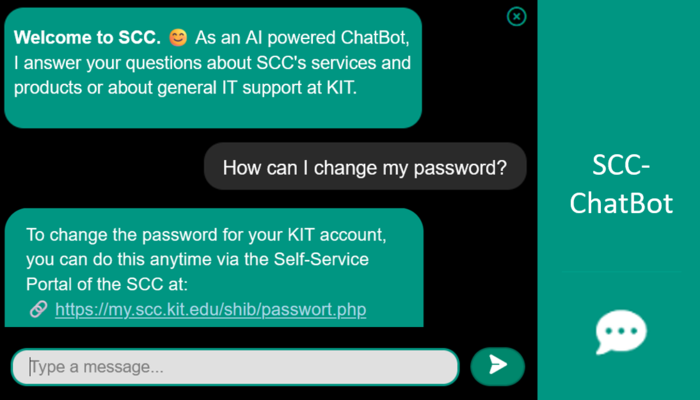
The AI chatbot enables context-aware queries – including questions about our services, from authentication to websites. It also searches internal documents and provides source references. The service is anonymous, GDPR-compliant, and available 24/7.
A ChatBot feature has recently been integrated into the right-hand sidebar of the SCC website. The system is based on artificial intelligence and enables context-aware, dialog-based information retrieval. The ChatBot complements the IT support as a quick assistance directly on the website. If the ChatBot doesn’t provide the right answer, our Service Desk team is, as always, personally available to assist you.
The ChatBot supports you in particular with questions about SCC services - from authentication procedures to website services. In addition, the digital assistant understands general website content and helps you to find the relevant information quickly without having to navigate through the extensive website.
A particular advantage: the answers contain direct links to sources that take you straight to the relevant pages. In addition, the ChatBot not only searches the publicly accessible website content, but also locally stored documents such as PDFs that cannot be found on the Internet - for example internal instructions or technical documentation.
The ChatBot remembers the context of the conversation (in the same Browser Session) and also takes into account previous questions and answers in order to make the interaction as efficient as possible. Requests are anonymous and cannot be assigned to a person.
Just start typing - the ChatBot answers immediately [1].
Two links at the bottom right of the ChatBot interface take you to the terms of use and a feedback function that you can use to provide feedback on the system directly by e-mail.
Further information can be found in the service description.
[1] General note: With AI-supported systems such as ChatBots, the correctness of the answers cannot always be guaranteed. Therefore, please also rate the answers with the thumbs-upor thumbs-downsymbols.
Achim Grindler
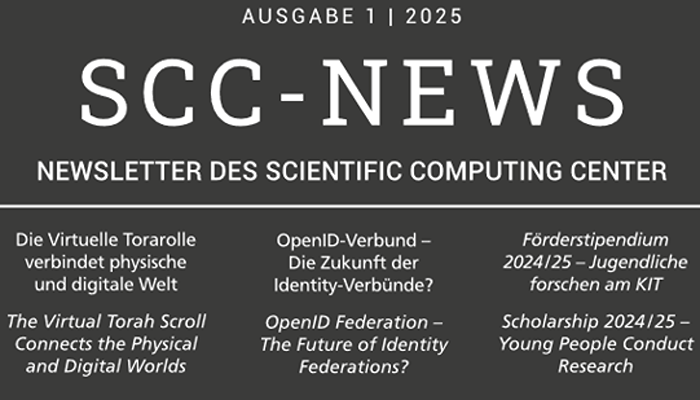
The new SCC News is online, including these topics: The virtual Torah Scroll Connects the Physical and Digital Worlds; OpenID Federation – The Future of Identity Federations?; Scholarship 2024 / 25 – Young People Conduct Research.
Download SCC-News 1/2025
Dear readers,
digitalization projects streamline processes, reduce paper usage, or eliminate it entirely — a shift from the tangible to the intangible, one might say. But things are different when it comes to digitizing Torah scrolls: in Jewish worship, they are irreplaceable, as they embody the material presence of divine holiness. For researchers, however, digital versions are immensely valuable. In the project Materialized Holiness, SCC scientists are working hand in hand with scholars from Judaic Studies and Materials Science from Berlin to uncover ancient secrets hidden in these cultural treasures — building a “digital bridge” to the past (p. 30).
At SCC, we see ourselves as bridge builders in many ways — as enablers of research and education at KIT, in Germany, Europe and worldwide. This is clearly reflected in our long-standing commitment to various AAI initiatives and especially in our active role in shaping open standards for multilateral identity federations — a vital bridge to the future of secure, federated identity systems and collaborative communities (p. 18).
Young talents also need solid bridges to explore new realms of knowledge. Through a scholarship program, SCC researchers mentor high school students over the course of a school year as they tackle challenging simulation projects. This creates a bridge for knowledge transfer into the world of “Simulated Realities.” And once again this year, we see how eagerly and creatively young minds cross it (p. 44).
Ultimately, it is scientific curiosity, technical excellence, and the joy of sharing knowledge that form the pillars supporting the bridges presented in this issue. These values were clearly reflected at the HAICON25 conference (cover page, p. 36), co-organized by SCC.
Enjoy reading this edition!
Martin Frank, Martin Nußbaumer, Achim Streit
Achim Grindler
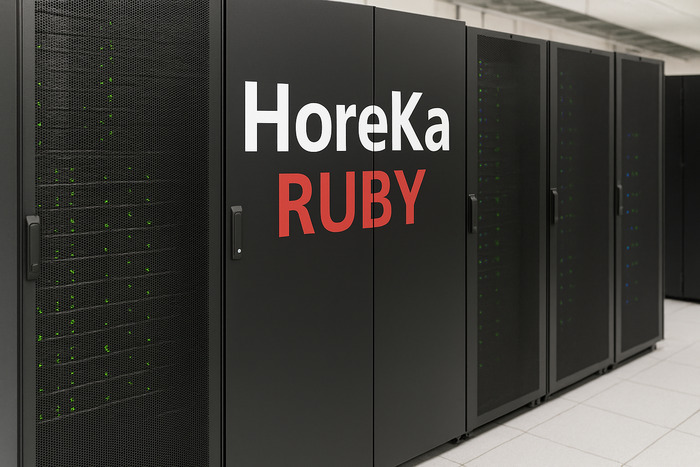
A new partition has been added to the HoreKa high-performance computer. With "HoreKa Ruby", resources are now available for computationally intensive AI and machine learning applications.
KIT’s high-performance computing system HoreKa is being expanded with HoreKa Ruby, a powerful new partition designed for AI and machine learning applications. The new partition is powered by NVIDIA H200 Tensor Core GPUs, specifically developed for data-intensive, highly scalable workloads and compute-heavy AI and machine learning tasks.
The expansion adds 13 nodes, each equipped with four NVIDIA H200 accelerators, offering 141 GB of memory per GPU.
HoreKa Ruby complements the existing HoreKa Blue, Green and Teal components and integrates seamlessly into the current infrastructure. Users benefit from cutting-edge hardware, high-speed InfiniBand connectivity, and energy-efficient cooling.
This expansion reinforces KIT’s role in national high-performance computing and is accessible to researchers across Germany through NHR@KIT.
Samuel Braun
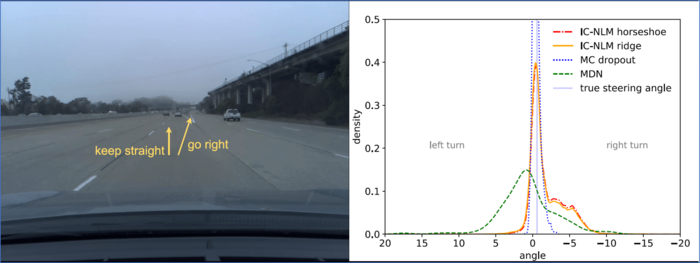
Clara Hoffmann and Prof. Nadja Klein from the SCC research group Methods for Big Data have been awarded the prestigious Mitchell Prize by the International Society for Bayesian Analysis for their research on improving algorithms for autonomous driving.
Clara Hoffmann and Prof. Nadja Klein from the SCC research group Methods for Big Data at the Karlsruhe Institute of Technology (KIT) have been awarded the prestigious Mitchell Prize sponsored by the Section on Bayesian Statistical Science (SBSS) of the ASA, the International Society for Bayesian Analysis (ISBA), and the Mitchell Prize Founders’ Committee.
Their paper, Marginally calibrated response distributions for end-to-end learning in autonomous driving, published in The Annals of Applied Statistics, was recognized for its outstanding contribution to statistical methodology with strong practical relevance. The research addresses uncertainty quantification in neural networks for autonomous driving – a key factor in ensuring the safety of such systems.
End-to-end models predict the steering angle directly from camera images but typically provide only point estimates. The method presented in the paper is based on the Implicit Copula Neural Linear Model (IC-NLM), which generates probability distributions for steering angles and is particularly well-calibrated. To make the approach scalable to large datasets, the authors employed a fast estimation technique using variational inference.
Tests with real driving data show that the IC-NLM is not only accurate but also more reliable in assessing its own predictive uncertainty compared to other models. This contributes to the explainability of neural networks. The award highlights the importance of statistical methods for safe AI applications – a key research focus at SCC.
Contact at SCC: Clara Hoffmann, Prof. Dr. Nadja Klein
Achim Grindler
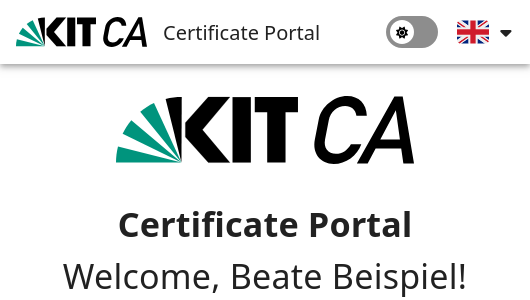
The new KIT-CA certificate portal went live in mid-June. For the first time, personal certificates are issued fully automatically after application and can be downloaded directly.
The new KIT-CA portal has made it much easier to obtain certificates required for signing and encrypting emails. Until recently, issuing a certificate was a paper-based process involving manual checks.
For the first time, the application process for personal certificates is fully automated. Certificate issuance requires no intervention from KIT-CA staff, the certificate can be downloaded directly. Publication in the global address book and inclusion in the CA search also works automatically.
After identifying yourself at the SCC Servicedesk, your name can be added to the certificate in addition to your email address. In order to identify any errors, the new certificate portal went online in mid-June without any major announcement. After a successful start-up phase, all KIT employees and students were informed about the new portal by email. Additionally, two-factor authentication was activated for portal access to prevent misuse by compromised accounts.
All employees and students are advised to obtain a personal certificate and to always sign their emails. If personal data belonging to third parties is sent by email, encryption is mandatory in order to comply with data protection requirements. If possible and not already done, you should first carry out personal identification at a suitable registration office in order to obtain a certificate with identification. However, it is now also possible to obtain a certificate without personal identification.
Functional certificates cannot be obtained completely automatically at this time: Certificate applications are first checked by KIT-CA staff. If there are no compliance violations, the certificate is issued. The user can then retrieve the certificate with a saved file and a file that is sent by email.
Further information about the concepts behind certificates can be found in the documentation.
Klara Mall, Peter Oettig, Heiko Reese and Konstantin Zangerle

SCC has expanded the login procedures for the central single sign-on to include a passwordless procedure. This login procedure is more secure and more convenient than the procedures previously provided.
After an extensive test phase, SCC now also offers a password-free procedure based on passkeys for all KIT accounts for logging into the central Web Single Sign-On (SSO).
Passkeys significantly increase the level of security
To log in with a passkey, personal devices such as notebooks, smartphones and USB authentication sticks are linked to your own account and the login service used. The device then only needs to be unlocked using a fingerprint, facial recognition or PIN to log in. This offers increased convenience and security compared to conventional methods with user IDs and passwords.
The following principles improve security:
A cryptographic key pair is created on the registered device, of which the private key remains in the device. Only this non-readable key matches the public key that is stored when registering with the SSO service.
During registration, the passkey on the authenticating device is linked to the domain for which it is issued, so that phishing attacks from cleverly disguised third-party domains (e.g. kit.de) are no longer possible.
The service description contains all information on how to set up the passwordless procedure recommended by SCC at KIT.
Achim Grindler
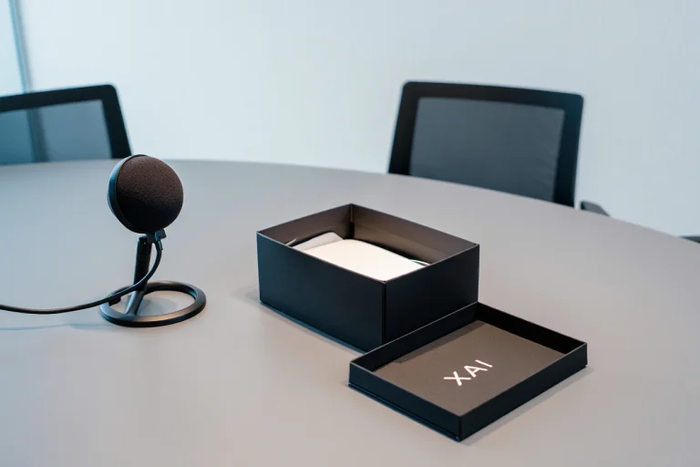
Why researchers cannot explain how AI models arrive at certain results (black box problem) and why this is extremely important for very specific domains: Nadja Klein and Tim Bündert from SCC are conducting research on XAI – “explainable AI.”
Artificial intelligence (AI) has become an integral part of our everyday lives. Without knowing how the linguistically appealing answers, realistic or futuristic-looking images, and super-fast decisions within the computer system are generated in a matter of seconds, we are increasingly using various AI tools in our work environment and private lives. AI is a helpful black box for users. However, unease should arise at the latest when AI models are used in self-driving cars or diagnostic systems in medicine, because it can be a matter of life and death if the AI makes incorrect, incomprehensible decisions.
Explainable AI (XAI) can be used to improve trust in the technology in such fields of application. XAI aims to make it possible to understand how AI works internally and according to which rules it generates results. Error diagnosis and thus improvement of the system is also possible with certain explainable AI models, which is not the case with large language models, for example.
Prof. Nadja Klein, research group leader at the SCC, is working with her team to shed light on the black box problem and, in a figurative sense, transform the opaque box that surrounds AI into a more transparent one that allows for greater insight than was previously possible. In the KIT research podcast "Campus Report", Stefan Fuchs talks to Prof. Nadja Klein and Tim Bündert (SCC, Methods for Big Data research group) about the challenges involved in developing transparent and trustworthy AI models.
Publications:
Martens, D., et al. (2025). Beware of "Explanations" of AI. arXiv preprint arXiv:2504.06791
Yanez Sarmiento, P., Witzke, S., Klein, N., & Renard, B.Y. (2024). Sparse Explanations of Neural Networks Using Pruned Layer-Wise Relevance Propagation. In: Machine Learning and Knowledge Discovery in Databases. Research Track. ECML PKDD 2024, 14944
Rügamer, D., Kolb, C., & Klein, N. (2023). Semi-Structured Distributional Regression. The American Statistician, 78(1), 88–99
Podcast Campus-Report: „Das Black-Box-Problem der Künstlichen Intelligenz“ – Forschende am Karlsruher Institut für Technologie arbeiten an Explainable AI (XAI) (Veröffentlicht am 22.07.2025, 1000183281)
Achim Grindler
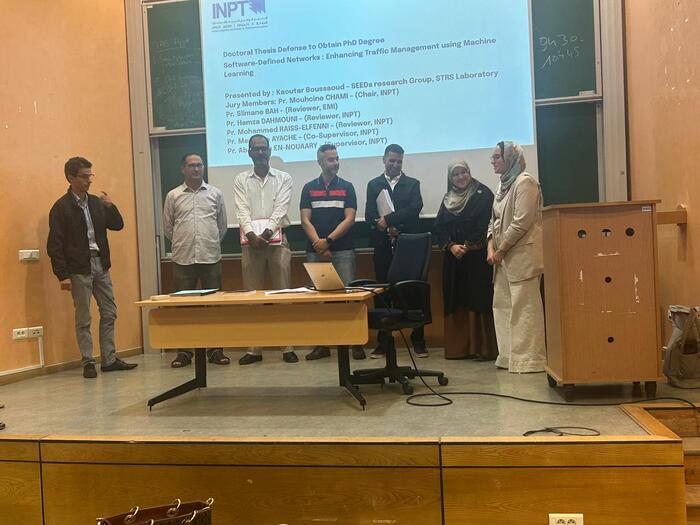
Ms. Kaoutar Boussaoud, software developer and researcher at SCC, successfully defended her PhD dissertation on June 12, 2025, at the National Institute of Posts and Telecommunications (INPT) in Rabat, Morocco.
Ms. Kaoutar Boussaoud, software developer and researcher at SCC, successfully defended her PhD dissertation on June 12, 2025, at the National Institute of Posts and Telecommunications (INPT) in Rabat, Morocco.
Her dissertation, conducted within the SEED research team of the STRS Laboratory (CEDOC2TI), presents a comprehensive data-driven approach to enhancing Software-Defined Networking (SDN) using machine learning and multi-agent reinforcement learning (MARL). Ms. Boussaoud developed advanced techniques for congestion detection and traffic optimization, including supervised flow classification, federated learning for distributed detection, and a Dueling DQN-based multi-agent framework that enables both proactive congestion control and adaptive bandwidth allocation. Her work further explores dual-agent architectures that integrate failure recovery strategies, increasing the resilience and robustness of SDN infrastructures under dynamic and large-scale network conditions.
At KIT, Kaoutar Boussaoud is part of the BMBF project DAPHONA, where she develops web services and designs algorithms for scientific data in the field of nanophotonics. Her work bridges innovative technologies and applied data science for scientific discovery.
SCC congratulates Kaoutar Boussaoud on the successful completion of her doctorate and wishes her all the best for her future career.
Dissertation of Kaoutar Boussaoud: Software-Defined Networks – Enhancing Traffic Management using Machine Learning
Achim Grindler
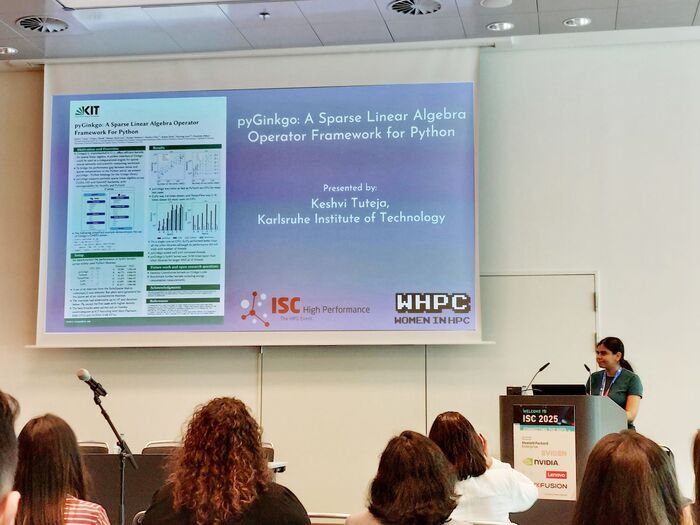
NHR@KIT fellow Keshvi Tuteja was honored with the “Women in HPC” Poster Award at the ISC High Performance Conference 2025 for her outstanding contribution to promoting diversity and excellence in High Performance Computing (HPC).
We are proud to announce that our NHR@KIT Fellow Keshvi Tuteja has been awarded the "Women in HPC" Poster Award at ISC 2025 for her outstanding contribution to advancing diversity and excellence in high-performance computing (HPC).
Her award-winning poster, titled "pyGinko: A Sparse Linear Algebra Operator Framework for Python", was selected from a highly competitive pool of submissions by talented female scientists from around the globe. The work showcases an innovative Python-based framework designed to accelerate sparse linear algebra operations—an essential component in scientific computing and simulation.
The research was carried out on our HoreKa supercomputer and co-authored by Gregor Olenik, Roman Mishchuk, Nicolas Venkovic, Markus Götz, Achim Streit, Hartwig Anzt, and Charlotte Debus.
This achievement marks a proud moment for NHR@KIT and reflects our commitment to supporting groundbreaking research and promoting gender diversity in the HPC community.
Congratulations to Keshvi and the entire team!
Funda Elewa
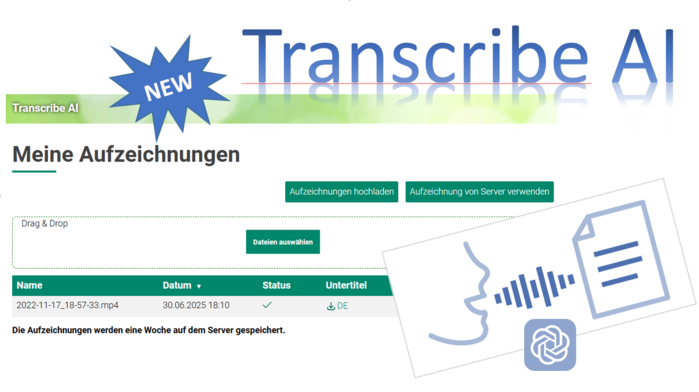
Audio and video recordings can now be converted into text and translated using Transcribe AI.
The Transcribe AI service allows employees, guests and partners with a valid KIT account to convert the spoken texts from an audio or video file into a text and subtitle file. Numerous audio or video formats are supported by conversion via the FFMPEG tool and can be uploaded to Transcribe AI in various ways.
The transcription is carried out on KIT's own hardware. Transcribe AI uses the OpenAI Whisper language model for text conversion and makes the result available for download for 7 days.
If a different target language is selected, the translation will be done using the EU service eTranslation, which is operated by the EU outside the KIT. Please refrain from translating critical content that may not leave the KIT and do not select a language other than the audio language as the target language.
Please take note of further information, such as the use of subtitles as well as requirements and restrictions in the service description Transcribe AI - Transcription of audio and video recordings.

"AI for Science" was the motto of the 5th Helmholtz AI Conference (HAICON25), which took place from June 3 to 5 at Messe Karlsruhe. It is one of the largest conferences in Germany in the field of artificial intelligence for research.
The 5th Helmholtz AI Conference (HAICON25) took place in Karlsruhe from June 3 to 5 under the motto "AI for Science". With almost 400 participants from various nations, it is one of the largest conferences in Germany in the field of artificial intelligence for scientific issues.
Over three conference days, HAICON25 offered a diverse scientific program on artificial intelligence in research. Current topics such as foundation models, explainable AI and deep learning for image and time series analysis were covered in several parallel sessions. The lecture program was supplemented by over 170 poster contributions in two poster sessions, which provided space for intensive professional exchange and numerous discussions.
The scientific program was complemented by two inspiring keynotes: Michael Bronstein (University of Oxford) spoke about the use of artificial intelligence in biology, while Ribana Roscher (University of Bonn) highlighted the role of AI for sustainable agriculture. Young researchers from KIT presented their work in the local session "Applied AI @ KIT" and in the session "AI Meets IA: Bridging German-French AI Research", opportunities and perspectives for cross-border cooperation were discussed.
A central goal of the conference was community building - promoted by a variety of formats such as the AI World Café, the Pitch & Networking Session, an entertaining Science Slam, the open Unconference, an atmospheric conference dinner in Karlsruhe's Wildpark Stadium and the Prologue Day on Campus North. HAICON25 impressively demonstrated that "AI for Science" is not just a motto, but a living reality.
You can find out more about the conference, the program and numerous presentations on the HAICON25 website.
Kaleb Phipps

Students can now submit requests online via the KIT students portal and only receive notifications regarding their studies in digital form.
KIT's Student Services are becoming even more efficient and environmentally friendly with new functions of the Campus Management Portal. Students can now submit requests, e.g. for leave of absence or de-registration, in digital form via the portal. KIT also saves paper and time when it comes to notifications for studies, which are now no longer sent by post, but to an electronic mailbox set up especially for this purpose, from where they can be retrieved online. The campus system immediately sends e-mails to the respective "student.kit.edu address" when new notifications are received in the "notification mailbox".
The SCC put these functions into operation at the beginning of June and Student Services provided detailed information in this circular.
Quick access:
Online requests
Notification mailbox
Achim Grindler
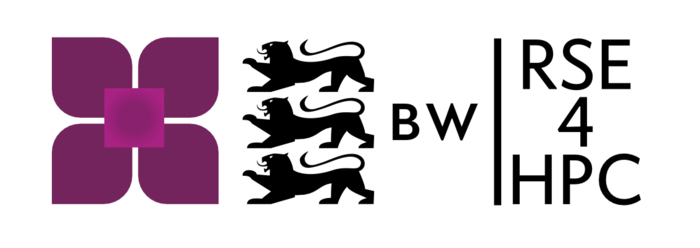
New state project bwRSE4HPC establishes support services for the use of research software in high-performance computing. It advises HPC users in their software-supported research and works with them to set up coding projects.
The use of computer-aided models is no longer limited to scientific and technical research areas, but is steadily increasing in all scientific fields. At the same time, these computer models are constantly evolving and offer researchers a wide range of new possibilities. For example, chemical reactions can be conveniently simulated on the computer, or complex measurement data can be evaluated by AI models.
However, the development of new models, especially if they are to be run on high-performance computers (HPC systems), requires additional skills in the field of research software engineering (RSE), which is not typically one of the core competencies of researchers. For them, the efficient and sustainable use of computer models represents a challenge that often cannot be overcome without expert support.
This is where the new state project bwRSE4HPC comes in. As part of a multi-stage support project, both experienced HPC users and HPC newcomers are advised in their software-supported research, and more stable, reliable and faster code is developed in joint projects. Researchers can apply via an online form with a specific RSE project for their computing project. For smaller projects and questions, an "exploration project" with a processing time of up to 6 weeks can be applied for. For longer collaborations of up to 6 months, a "realization project" is recommended.
You can find more details on the development page www.bwrse4hpc.de. If you would like to contact the support team directly, please send an e-mail to support@bwrse4hpc.de.
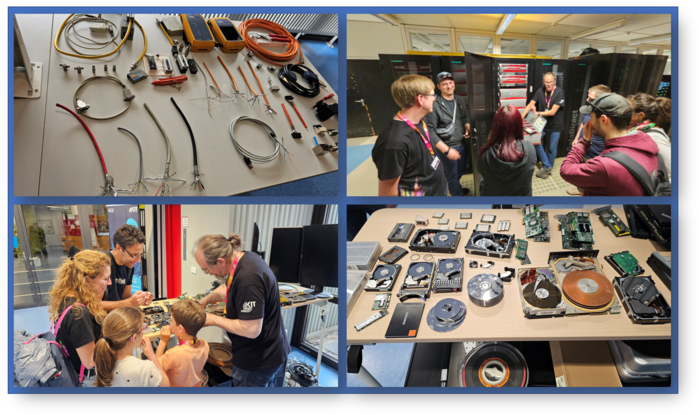
On May 17, the SCC at Campus South opened its doors. Various computer and network components were on display in an exhibition and guided tours of the technology rooms were offered.
Every day, we use colorful programs on our PCs or applications on the Internet or intranet without noticing the IT infrastructure and services behind them. Much remains hidden from us when everything is running smoothly. What we see is only the tip of the iceberg, the rest "stands and runs" in the data centers. Even on your own laptop, PC or tablet, the technology is so integrated in chips that individual functional groups are no longer recognizable, let alone expandable.
On KIT's Open Day, visitors, whether children or adults, were able to see and touch some of these invisible hardware components in two exhibitions in the SCC building and even disassemble and reassemble them.
The network department's "hardware petting zoo" displayed measuring devices, network components and connection cables sorted by type on two tables - from fiber optic and copper cables and various fiber optic connection adapters to different WLAN access points and network switches, to name just a few. The exhibition was supervised by colleagues and student assistants from the network team.
Various rack servers and their inner workings could be admired at the exhibition opposite: Hard disks, memory slots, fans, processor chips and much more. The exhibition also included historical computer parts from the last five decades, with colleagues from the systems and servers team on hand to answer questions and help visitors dismantle entire hard disks or server trays.
A highlight of the event was that the hardware could not only be viewed as part of the exhibition, but also in the data center rooms. On the tour through the basement, the participants saw the large tape library, the directly water-cooled high-performance computers, the high-performance storage systems and the network rooms with thousands of cables.
We were delighted with the keen interest shown by visitors of all ages, and it was fun to make a large part of the "IT iceberg" visible and tangible for outsiders.
To the KIT press release
Achim Grindler
_rdax_700x555.png)
Milestone for the OpenID Federation Standard: At the end of April, 30 experts tested the interoperability of existing implementations at a three-day meeting. KIT used the event to verify its own reference implementation with others.
OpenID Federation is an open standard from the OpenID Foundation for interconnecting multilateral IT federations. The standard has been under development for nine years and is now close to completion. This opens up new possibilities for the identity federations currently based on the SAML protocol, such as those used in the DFN AAI and eduGAIN.
An important milestone on this path was a three-day meeting of 30 experts and developers at end of April to test the interoperability of existing implementations. KIT was also represented at this meeting and was able to verify its own reference implementation created in the Go programming language with others. The test federation provided by KIT's SCC was very well received and commended. Other development teams were able to join this test federation with their infrastructure and thus verify interoperability with other implementations and components.
In addition to practical activities, there were also a number of smaller and larger discussions to address outstanding issues. This has enabled the specification to be taken a step further. After a long-running process, a final publication is now expected before the end of the year.
In addition to the main OpenID Federation specification, there will also be extensions. KIT will play a leading role in one of these extensions as part of the Geant Trust & Identity Incubator.
Further information: openid.net/the-openid-federation-interoperability-event
Contact at SCC: Gabriel Zachmann

The Podcast Modellansatz is a medium of the Department of Mathematics. Here, researchers, graduates and teachers from KIT report first-hand on what they are currently working on. This time with Nadja Klein from SCC.
In episode 253 Bayesian Learning, Gudrun Thäter talks to Nadja Klein and Moussa Kassem Sbeyti from SCC. Nadja Klein and Moussa Sbeyti focus on method development at the intersection of statistics and machine learning, in particular on Bayesian methods, which allow to incorporate prior knowledge, quantify uncertainties, and bring insights into the black boxes of machine learning.
Click here for the podcast
Further information on the research group Methods for Big Data, which Nadja Klein leads at SCC.
Contact: Prof. Dr. Nadja Klein
Achim Grindler
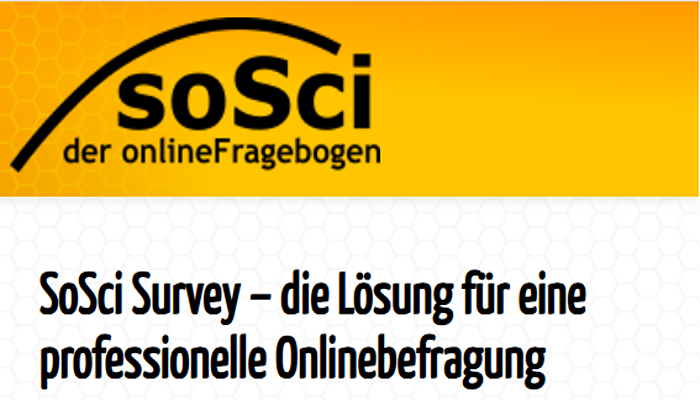
Providing the IT infrastructure for anonymous surveys
The SCC provides the “SoSci Survey” tool for conducting online surveys. This enables anonymous surveys for KIT employees, students and people with a guest and partner account (GuP account).
The service includes the provision of the server-side infrastructure and the operation of the necessary modules. The support of the local infrastructure available to the respective user and advice on survey design are not part of the SCC's portfolio.
The university license used may only be used for non-commercial surveys.
This means that the respective study may not be conducted on behalf of or in cooperation or coordination with a profit-oriented company. We would also like to point out the further conditions for free use for non-commercial online surveys on the SoSci Survey website.
Further information can be found in the service description, which also refers to the privacy policy for the use of SoSci Survey.
Note: Overview of other tools for collaboration.
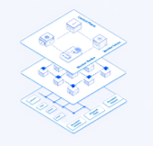
The new Kubernetes evaluation project (Kube 3) focuses on the further development of cloud infrastructures in the state of Baden-Württemberg for the cross-location provision of Kubernetes.
Kubernetes is becoming relevant as a scaling infrastructure technology for more and more services. The Kubernetes evaluation project (Kube 3) focuses on the further development of cloud infrastructures in the state of Baden-Württemberg for the provision of Kubernetes. This also supports existing approaches in current bw projects, including bwGitLab, bwJupyter and bwCloud. The aim of the project is to develop and implement the necessary concepts and methods as well as forms of cross-university collaboration and to test them with specific use cases.
Together with the project partners, the University of Heidelberg and Tübingen, a cross-location Kubernetes testbed is to be set up to investigate whether and how this platform can be used to operate shared service infrastructures in the future.
The requirements to be evaluated are consequently the connection to federated authentication and authorization infrastructures (AAI), questions regarding multi-tenancy and information security, deployment models in the form of Kubernetes-as-a-Service (KaaS), as well as the management of projects that are to be implemented on these platforms.
The cross-university opening and transferability of services between the Kubernetes platforms operated at different locations will be investigated on the basis of use cases. The project is part of a cross-national, joint effort to bundle their IT infrastructures as a basis for highly scalable IT services. This means extending the evaluations outlined above in the project to a larger, cross-national scenario.
Contact: Klara Mall
Achim Grindler

At the beginning of April, 13 schoolgirls from grades 7 to 11 attended a workshop organized by the SCC project Computational and Mathematical Modeling Program (CAMMP) as part of this year's Girls' Day.
On April 3, 2025, thirteen schoolgirls from grades 7 to 11 attended the workshop "AI in Medicine - Using Mathematics to Solve Real Problems" offered by the SCC's Computational and Mathematical Modeling Program (CAMMP) project as part of Girls' Day. Girls' Day gives secondary school students the opportunity to gain an insight into the research fields at KIT.
After a welcome in the Audimax, the schoolgirls were accompanied to the workshop. There, the workshop team Lisa-Marie Volz and Cedric Neuwirth (student assistants at CAMMP) welcomed them and introduced them to the subject area of classification problems, for example via everyday application examples such as an e-mail spam filter. The students then worked in small groups to develop their own model for classification in medical diagnosis. In doing so, they dealt with the functioning of AI systems on a simple level and became aware of the importance of mathematics in such systems and how it is used there. The students then trained their own AI systems for classifying images in groups of two, which the other students were then allowed to try out in a gallery walk. Finally, the workshop participants discussed the limits and expansion possibilities of the model they had previously created together with the project members. At the end of Girls'Day at KIT, the students were accompanied to the Audimax and bid farewell.
Contact: Dr. Katharina Bata
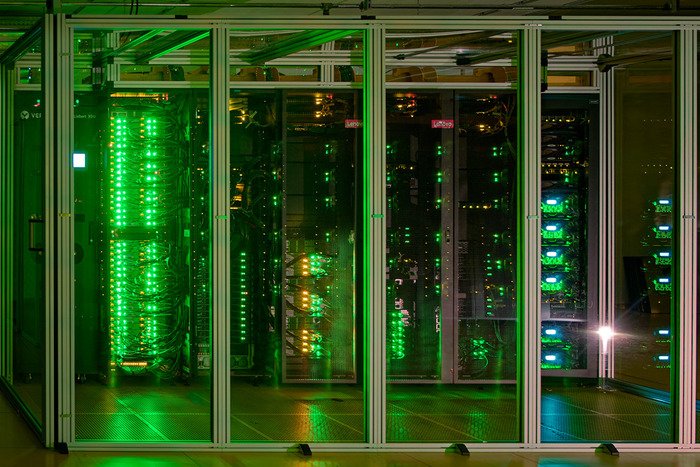
The new parallel computing system bwUniCluster 3.0 went into operation on April 7, 2025. The HPC system now consists of more than 370 computing nodes and provides all participating universities in Baden-Württemberg with a basic supply.
The expanded HPC system bwUniCluster 3.0 now consists of more than 370 SMP nodes with 64-bit processors from AMD and Intel. It offers the universities of the state of Baden-Württemberg a basic supply and can be used free of charge by the employees of all participating universities.
The massive parallel computer integrates around 90 new computing nodes, which are operated at the KIT North Campus. A further 280 or so nodes come from the expansion of bwUniCluster 2.0 from 2022 and will continue to be operated at the KIT South Campus. Thanks to modern components and the existing infrastructure for hot water cooling at the North Campus, the now significantly more powerful hardware of the cluster can be operated even more energy-efficiently.
Compute power: 7,1 PetaFlop/s
112 Graphics processing units
ca 27.000 Compute cores
Further information on bwUniCluster 3.0
Contact: Dr.-Ing. Samuel Braun
Funda Elewa
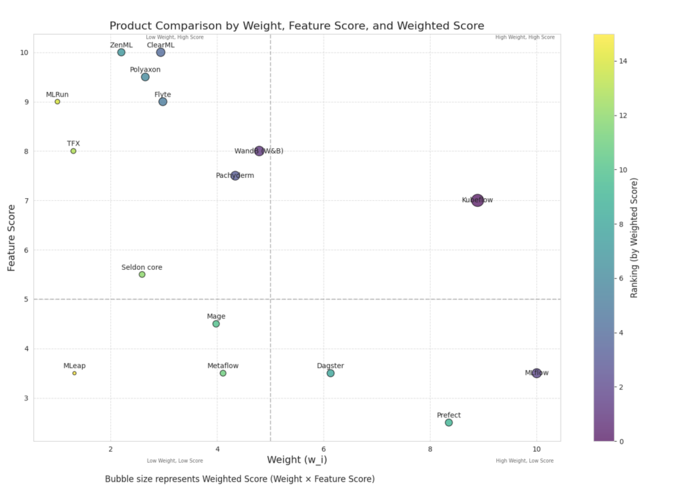
Researchers from the AI4EOSC project, whith KIT as a partner, have conducted a comprehensive study on the landscape of Machine Learning Operations (MLOps) and evaluated 16 widely used platforms.
Researchers from the AI4EOSC Project (with KIT as a partner) have conducted a comprehensive study on the landscape of Machine Learning Operations (MLOps) platforms, providing valuable insights into their features/capabilities and adoption metrics.
The study evaluated 16 widely used MLOps tools, focusing on capabilities such as experiment tracking, model deployment, and inference. The findings offer a decision-making framework to assist organizations in selecting appropriate MLOps solutions, whether they require end-to-end platforms or specialized tools.
Key Highlights:
Feature Analysis: The study presents an in-depth evaluation of 16 MLOps platforms, highlighting essential components for robust MLOps solutions.
Adoption Metrics: By assessing GitHub stars' growth, the research provides insights into the adoption and prominence of these platforms.
Decision-Making Framework: A weighted scoring method and a decision-making flowchart are introduced to simplify platform selection for organizations.
These insights are crucial for organizations aiming to initiate or enhance their MLOps strategies, ensuring scalability, reproducibility, and operational success in managing and monitoring machine learning models in production.
Further information:
AI4EOSC website
Publication in Springer Nature
Contact at SCC: Dr. Lisana Berberi
Achim Grindler
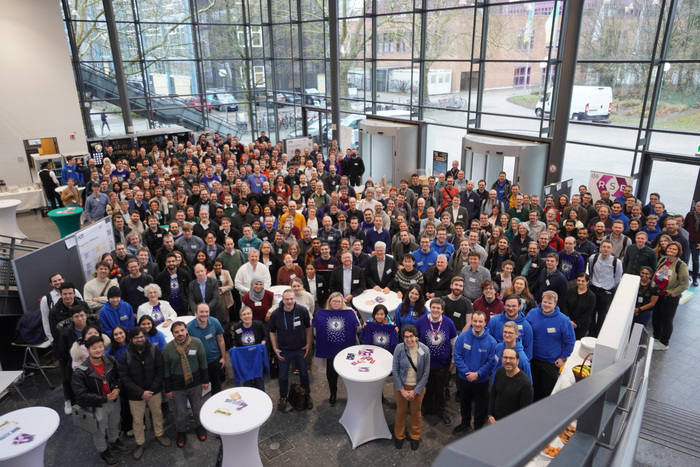
Over 300 research software and research software engineering enthusiasts came together in Karlsruhe for the deRSE25 conference.
From February 25 - 27, KIT and its Scientific Computing Center hosted the 5th conference for Research Software Engineering in Germany, the German conference for Research Software Engineers and people interested in Research Software.
Over 300 participants, national and international, came to Karlsruhe to present, discuss and contribute their insights, work and thoughts on Research Software and Research Software Engineering. In total over 170 contributions were scheduled in the three days of the conference, summing up to an stagering over 72 hours of content. The scientific program was framed by two inspiring keynotes from Bálint Aradi, University of Bremen, and Michael Felderer, Institute for Software Technology, German Aerospace Center and University of Cologne, presenting their view on the field of RSE and RSEs.
The deRSE25 conference was co-located with the Software Engineering 25 conference. Details on the conference, the program as well as many of the presented slides can be found on the conference hompage.
René Caspart
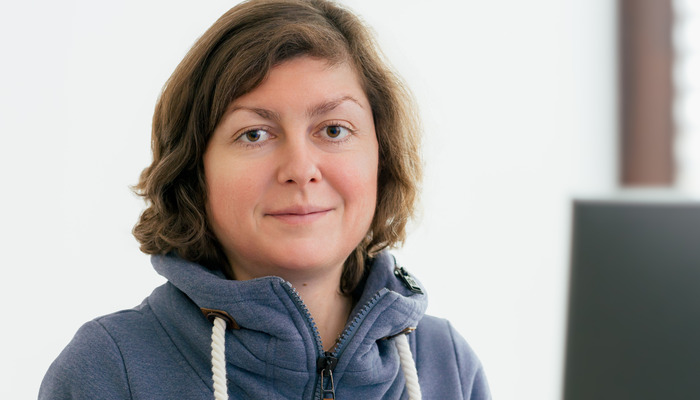
Prof. Dr. Nadja Klein has been awarded the Emerging Leader Award of the Committee of Presidents of Statistical Societies (COPSS), a prestigious recognition of her contributions to the field of statistics.
Prof. Dr. Nadja Klein, professor and lead of the Methods for Big Data research group, has been awarded the Emerging Leader Award of the Committee of Presidents of Statistical Societies (COPSS), a prestigious recognition of her contributions to the field of statistics.
This award honors early-career statisticians who demonstrate outstanding leadership and research impact. Nadja’s work spans Bayesian deep learning, computational methods, and spatial statistics, with a strong commitment to advancing statistical methodology, mentoring the next generation of researchers, and ensuring methods and software are accessible to researchers and practitioners.
The award will be presented at the Joint Statistical Meetings 2025 in Nashville, Tennessee.
SCC warmly congratulates Nadja Klein on this prestigious recognition.
Read more
Achim Grindler
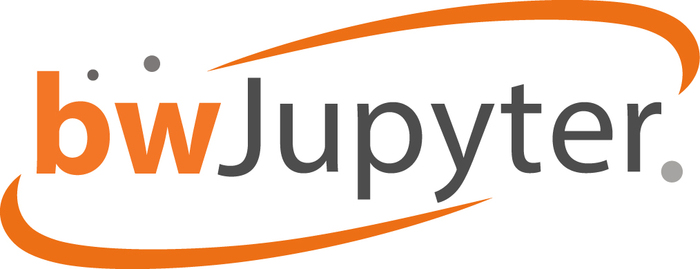
SCC and the University of Stuttgart are developing a new state service "bwJupyter for teaching", which is now available to all lecturers and students.
As part of the dialog process "Universities in the digital world" of the Ministry of Science, Research and Arts Baden-Württemberg, SCC and the University of Stuttgart are developing a new state service "bwJupyter for teaching".
Jupyter is a web application that provides users with access to computing environments and resources without burdening them with installation and maintenance tasks. After requesting a resource, the user is forwarded to a Jupyterlab environment. A central component of Jupyter is the Jupyter Notebook. This is a document that can simultaneously contain formatted continuous text, executable code sections and (interactive) visualizations (image, sound, video, 3D views).
In the past two semesters, selected courses have already been able to test the new service. Around 1000 users from six universities had access to the pilot hub during the winter term 24/25.
The new bwJupyterHub for teaching is now available to all lecturers and students. Registration is conveniently managed via the state-wide identity management system bwIDM; no additional registration is required.
With the state-wide opening, there are also numerous new features. For example, lecturers can create their own notebook profiles and share them with their students. In addition to the ten notebook options provided, such as Jupyter Datascience with Phython, R and Julia; Jupyter Tensorflow or Jupyter GPU, lecturers can now also use their own Docker images. Moreover, lecturers can share larger files and continuously edit course material via a shared directory.
Further features such as a grading function for exercise sheets and a connection to the ILIAS and Moodle learning platforms will be tested during the summer term.
Further information and detailed documentation
Dr. Jasmin Hörter
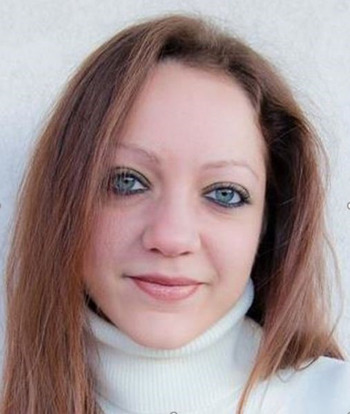
Rossella Aversa has headed the Data Exploitation Methods (DEM) department at the SCC since December 1, 2024. She took over from Rainer Stotzka, who previously headed the department and is now entering well-deserved retirement.
We are pleased to announce the appointment of Ms. Rossella Aversa as head of the Data Exploitation Methods (DEM) department at SCC. On December 1, 2024, She took over from Rainer Stotzka, who previously headed the department and is now entering well-deserved retirement.
After her studies, Ms. Aversa completed her doctorate in astrophysics in 2015 and also obtained a Master's degree in High Performance Computing in 2016. From 2016 to 2019, she worked as a PostDoc at the National Research Council in Trieste, researching new methods of research data management in connection with artificial intelligence.
She joined the DEM department at SCC in 2019 and took over as Head of Research & Development for Materials and Nanosciences in 2022.
The Data Exploitation Methods department researches new methods for research data and metadata management and develops software for data analysis and innovative services for efficient research data management. The most important areas of application are in materials science and nanoscience, digital humanities and the German National Research Data Infrastructure (NFDI).
Contact: Dr. Rossella Aversa
Achim Grindler

SCC has launched a centralized service for the efficient operation of IT infrastructure. To operate servers efficiently, organizational units can rent a fully operational data center unit at SCC.
In February 2025, SCC started pilot operations at Campus South for central server housing. The service provides data centre space for KIT organizational units to operate servers. Cabinets equipped with power supply and air conditioning can be rented for this purpose. The network connection of the cabinet can be selected from two variants. The cabinets are available in two different sizes and are secured by access control.
The service will run for one year in trial operation (pilot) and will then go into production following a review.
To the service description
Achim Grindler
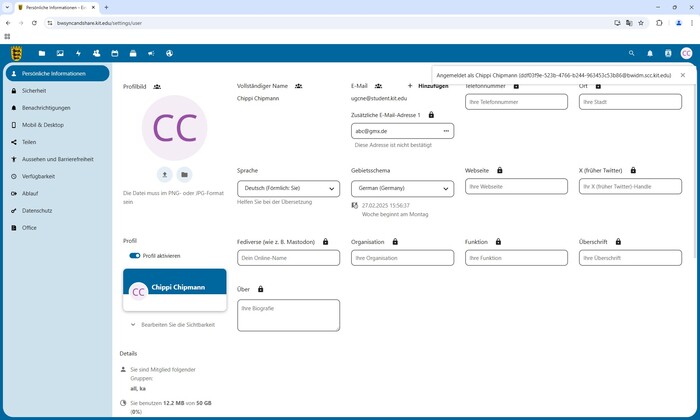
In bwSync&Share, additional email addresses can now be used to share data. "Collabora Online" has been running as a new online office solution since July 2024 and a database vulnerability was fixed in November 2024.
The bwSync&Share storage service has been given a new function that makes it easier to share files. When registering for the service, only the user's address stored in the federated identity management system bwIDM (= primary email address) is assigned and data previously had to be shared with exactly this email address. In the past, if a different email address was specified for the recipient when sharing, an additional guest account was created via which the data was shared. As a result, the shared data was not visible in the bwSync&Share account assigned to the primary email address.
With the new function, users can add additional e-mail addresses of their own to their bw-Sync&Share account. This means that data shared with these additional addresses will be available to users in the bwSync&Share account associated with their primary email address. Further information can be found in the FAQ for the bwSync&Share service.
In the middle of last year, the online office solution--> was successfully switched to Collabora Online in the service without any disruptions. This solution is based on a customized version of LibreOffice and is maintained and further developed as free software by Collabora Ltd. from Cambridge (England). Thanks to the close integration with Nextcloud, Collabora Online works seamlessly with the synchronization platform
In addition, after intensive troubleshooting with NextCloud and MariaDB support in November 2024, a vulnerability was identified and eliminated that was sporadically responsible for brief service interruptions in the past.
Sabine Lorenz
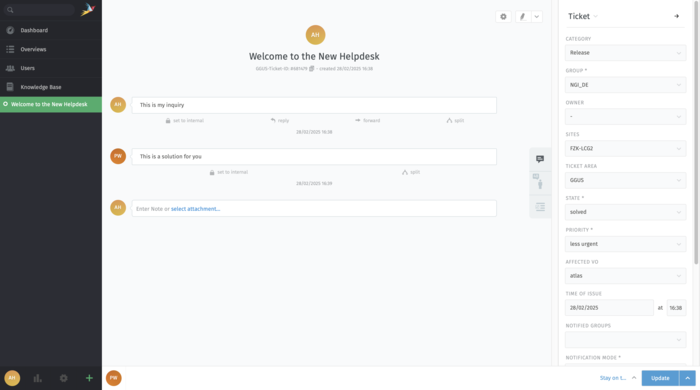
After more than 20 years of successful operation, the Global Grid User Support System (GGUS) developed at SCC is being replaced by a new ticketing system. The change was preceded by more than two years of research, consulting and custom development.
SCC at KIT is well known internationally for providing a ticketing system known as the Global Grid User Support (GGUS), used by the Worldwide LHC Computing Grid (WLCG) and European Grid Infrastructure (EGI) communities incorporating over 170 computing centres in more than 42 countries. The GGUS offers these large communities an integrated platform designed to handle user inquiries, incidents and service requests and coordinate between computing centres. The GGUS operations reinforce the principles of open-science, improving the accessibility of scientific research and ensuring the timely resolution of problems.
After over 20 years of successful operations, the SCC's custom-developed legacy GGUS system was replaced on January 29th by an open-source ticketing system developed by Zammad GmbH. The transition was preceded by more than two years of research, consultations, and custom developments that enabled the workflows established in the communities over the years of experience. The new ticketing system brings the communities a modern tech stack and new perspectives.
At the same time, the new Zammad's ticketing system also took over the xGUS, the child of the GGUS, serving smaller communities. The switchover of the ticketing system for the BW and KIT NHR support portals took place on February 19th.
SCC continues to host and enhance the new ticketing system for the communities mentioned above, as well as other communities such as European Open Science Cloud (EOSC).
Users are nostalgic about the legacy ticketing system that was home to their smart resolutions. At the same time, they warmly welcome the new system.
Further information in the magazine EGI Inspired
Contact at SCC: Dr. Pavel Weber, Dr. Aliaksei Hrynevich
Achim Grindler
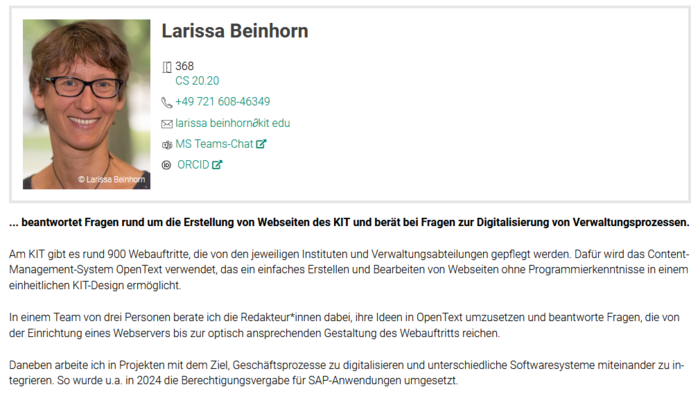
Create your short profile, add your ORCID or share your MS Teams link: discover the new possibilities in the SCC self-service portal my.scc.kit.edu
Example of a person page
Example of person list with new layout
To introduce persons, there are the person pages on the websites. With a data protection-compliant link to the KIT account, the content displayed on the person page can be edited in the SCC self-service portal and released for different areas (internal/external).
In order to publish person pages on KIT websites in compliance with data protection regulations, OpenText editorial staff members should use the import personal data from the communication directory function, which links the personal page to the person's KIT user account. In this way, each KIT employee can determine in the SCC self-service portal with what scope their personal data is visible, e.g. only on the KIT intranet or worldwide.
Further options have now been added to the attributes that can be released by the individual person: the ORCID, the Microsoft Teams link and a text field for a short profile. Once the data has been maintained and released as required, it is automatically displayed on the person pages.
Lists of persons have also been given a new layout that can be used, for example, to present the members of a research group in an appealing way, now also with the short profile entered in the self-service portal (figure below).
Contact: webmaster@kit.edu
Larissa Beinhorn
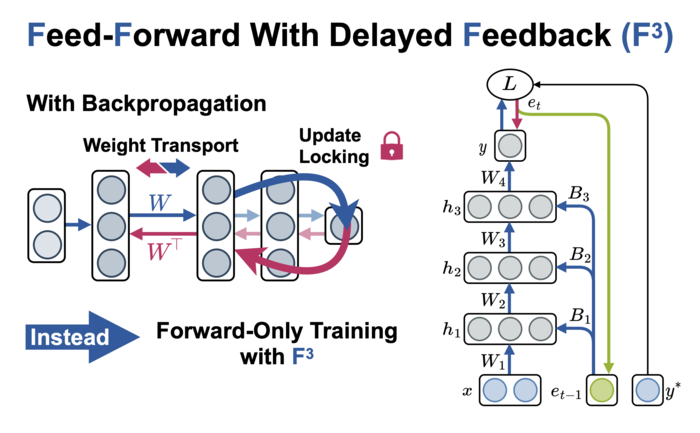
A team of SCC scientists won the Best Paper Award at the International Conference on Neural Information Processing in December 2024 for an alternative training approach for neural networks.
With the paper "Feed-Forward Optimization With Delayed Feedback for Neural Network Training," a team of SCC scientists under the supervision of Prof. Dr. Achim Streit won the Best Paper Award at the International Conference on Neural Information Processing 2024.
The paper introduces a novel method for training neural networks in a more biologically plausible and energy-efficient way by using approximate gradients. Typically, neural networks are trained using gradient descent, where the network parameters are iteratively updated by stepping into the direction of the negative gradient. The most common approach for computing such gradients is backpropagation, which computes the gradient in a backward pass. This backward pass, however, is biologically implausible, computationally expensive, and hinders parallelization. By using additional random feedback connections and delayed error information, SCC scientists introduce a new method to approximate the gradients using only forward passes. This not only solves two core issues of the biological implausibility but can also reduce the energy consumption per epoch by up to 25% and enables new possibilities for parallelization.
This work is funded by the Helmholtz AI platform and HAICORE@KIT grants.
Contact at SCC: Katharina Flügel, Dr. Markus Götz
Preprint: https://arxiv.org/abs/2304.13372
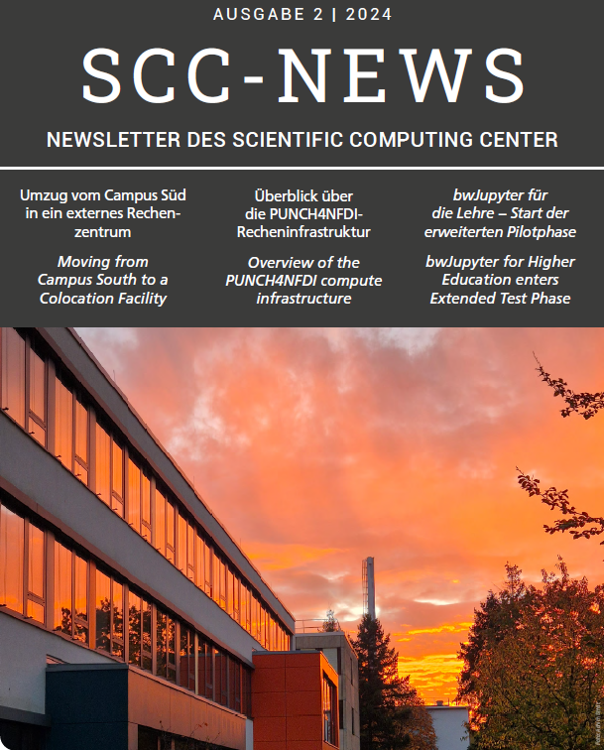
The new SCC News is online, including these topics: Moving from Campus South to a Colocation Facility; Overview of the PUNCH4NFDI compute infrastructure; bwJupyter for Higher Education enters Extended Test Phase.
Download SCC-News 2/2024
Dear readers,
A scientific computing center such as SCC is involved in all the missions of KIT: research, teaching, knowledge transfer, as well as the operation and support of fundamental IT services – internally, for "The Länd," in Germany, and beyond. Each of our target groups engages with information technology and research and development in a distinct manner. Even more intriguing: each target group "speaks" a different language and has unique needs and expectations – whether they are students, educators, administrative staff, or researchers across various disciplines. In a dynamic and innovative working environment like KIT, all infrastructures, services, and applications provided by SCC and its partners are essential.
The core competency for successful collaboration with these diverse groups, therefore, lies in translating their requirements into a language that is comprehensible to all stakeholders. None of the projects presented in this edition is alike.
On page 28, we provide an overview of how a federated IT infrastructure meets the highly complex requirements for data management and processing from national and international researchers in nuclear, astrophysics, and astroparticle physics.
A completely different clientele is involved in the pilot phase of the service "bwJupyter for Teaching”. This initiative aims to enable educators and students to efficiently and intuitively access tools for mathematical simulation alongside the appropriate computational resources (p. 37).
Even a seemingly mundane task, such as relocating IT infrastructure to an external data centre, engages a wide range of people – from service providers and SCC staff to participants KIT-wide. Read more about this extensive project on page 5.
Enjoy reading this edition!
Martin Frank, Martin Nußbaumer, Achim Streit
Achim Grindler
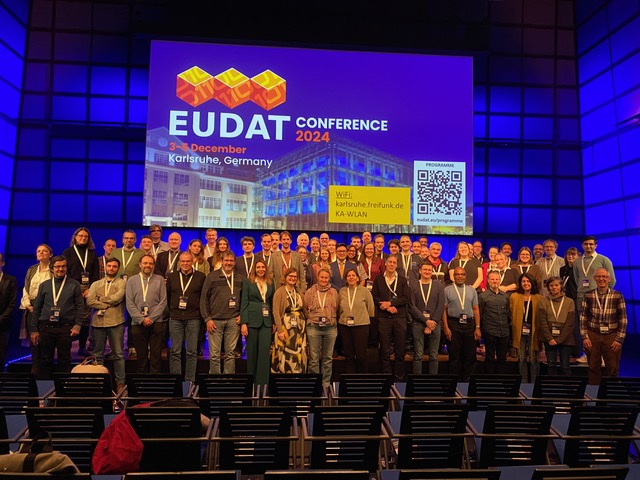
Science communities and data infrastructure providers work together to enhance scientific data services in Europe. An intensive exchange took place at the EUDAT Conference 2024 in Karlsruhe.
More than 110 participants from 20 countries took part in discussions on improving services and developing research data management at the conference organised with SCC. Speakers from the e-infrastructures EGI, EUDAT , GÉANT, OpenAire, from the scientific communities EBRAINS, Helmholtz AI, ENVRI-Hub NEXT, OSCARS, eLTER and others, adding supported by such as EOSC EU Node, Base4NFDI, FAIRCORE4EOSC and EOSC Beyond met an interested audience in the premises of the world-renowned Center for Art and Media Karlsruhe, ZKM. The presentations as well as the discussions and informal talks on the conference floor showed the interest and the necessity to intensify the cooperation with research and research organisations and providers of interoperable and international data services and their developers.
KIT is a member of EUDAT CDI, one of the leading European data infrastructures providing services to over 100 communities and groups.
Jos van Wezel

The topics on the agenda of the 28th ITB Assembly met with great interest. Over 300 people attended to find out about innovations to the SCC's range of services.
The SCC welcomed over 300 people from around 120 organizational units.
The information on the urgent need for action in the context of the certification service (KIT-CA) was particularly important. The IT officers received information about necessary measures after it recently became known that the CA service provider Sectigo had surprisingly terminated its contract with GÉANT early. This means that the issuing of certificates at KIT will no longer be secured from 01.10.25 and certificates that expire in 2025 should in any case be renewed by the end of the year 2024.
Mr. Axel Maurer explained the technical basis of the KIT-Card and highlighted the security aspects of the KIT-Card. The KIT-Card meets the highest security requirements (Commen Criteria certification of EAL5+) if it is used by applications with DESFire. Interested parties are welcome to contact the KIT-Card Service Team if they have any questions regarding the use of the KIT-Card for specific applications.
The portfolio of services offered by the SCC is constantly being expanded. We also took a look at new and future IT services at the SCC.
With a view to the M365 roadmap, the SCC provided information about the introduction of Microsoft OneDrive and SharePoint online. OneDrive will be offered as an additional data service at KIT in the future. The pilot phase in which various organizational units at KIT are participating is currently underway. OneDrive and Teams are based on SharePoint online, which means that SharePoint online can soon be used by several teams to manage documents. The SCC is calling on interested IT officers to participate in the development of these services.
The digitalization of administrative processes is already supported by the new KIT approval portal, which is described in detail in our SCC News 01|2024. A few processes have already been implemented there.
From 02/2025, the SCC can offer the organizational units at KIT data center space on the South Campus for the operation of server systems. The infrastructure and characteristics of the future “server housing” service were presented.
And AI is not stopping at the SCC's portfolio of services either. A new service will support transcription with OpenAI Whisper on local hardware and enable translation by the EU eTranslation service, while the two state projects bwCloud3 and bwJupyter are concerned with the addition of corresponding AI components (LLMs, Runner Harbor, K8s), among other things.
Further information and topics can be found in the presentation for the ITB meeting.
Birgit Junker
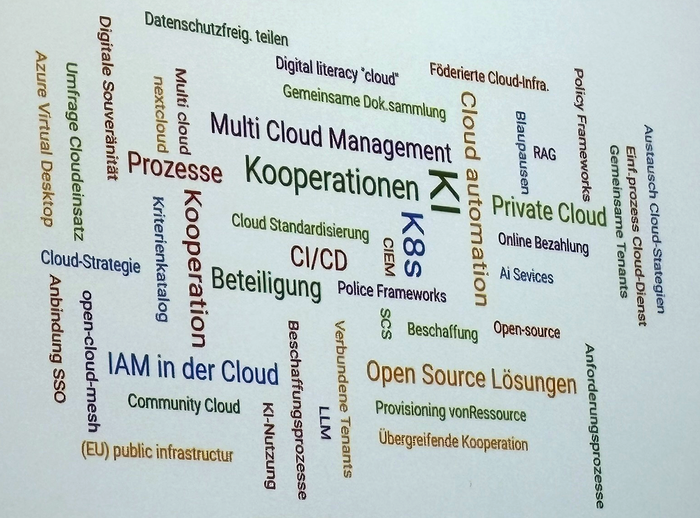
The "Cloud Management" working group of the ZKI e.V. met on November 13/14, 2024 at the SCC of the KIT to discuss cloud strategies and experiences.
Translated with DeepL.com
Dr. Martin Nußbaumer, Director of SCC, and Torsten Prill, Chairman of ZKI e.V., welcomed the 58 participants to KIT Campus South. The agenda focused on two main topics - on the one hand, the different aspects of the cloud strategies of universities and colleges and, on the other hand, practical experience with the cloud computing models Infrastructure as a Service (IaaS) and Platform as a Service.
The presentations on "Cloud strategies of the federal states and universities" showed a wide range of possible ways of dealing with "the cloud" and inspired a very lively exchange, as did the "(Practical) experiences with the use of IaaS and PaaS, especially at universities".
However, both focal points only represent small sections of the overall complex of the "Cloud Management" working group, as the joint identification of topics for the future of the working group showed. In addition, the report Cloud Management - Changes in administrative and provisioning processes, to which many working group members contributed, has now been officially published.
Patrick von der Hagen, Ulrich Weiß

On October 31, Daniel Coquelin defended his dissertation and successfully completed his doctorate at the KIT Department of Informatics with this important step.
Mr. Daniel Coquelin successfully completed his dissertation on 31.10.2024. His research focus in recent years has been on distributed machine learning.
Mr. Coquelin has made valuable contributions to distributed machine learning, particularly in the area of data parallel neural networks. His early work focused on communication-avoiding approaches to data parallel training. He then investigated the behavior of neural networks during training, observing that the orthogonal basis of weight matrices tends to stabilize during training. Based on this insight, he developed a novel method for training low-rank neural networks on distributed memory systems. This method allows for efficient scaling of training across multiple devices, leading to compressed neural networks that can outperform their full-rank counterparts. His work has implications for large-scale applications like natural language processing and computer vision. Mr. Coquelin's work was funded by the Helmholtz Analytics Framework (HAF) project and the Helmholtz Artificial Intelligence Cooperation Unit (Helmholtz AI) platform.
SCC congratulates Mr. Coquelin on the successful completion of his doctorate and wishes him all the best for his future career.
Dissertation of Daniel Coquelin: Optimization of AI Methods on Distributed-Memory Computing Architectures
[1] Prof. Ina Schäfer (KIT, Chair of the Examination Board), Prof. Achim Streit (KIT, first supervisor), Prof. Håkan Grahn (Blekinge Tekniska Högskola (BTH), Sweden, external examiner/opponent), Prof. Ralf Reussner (KIT, examiner) , Prof. Thorsten Strufe (KIT, examiner)
Achim Grindler

Tim Niklas Uhl from KIT was one of the winners of this year's Golden Spike Awards. They were presented at the 27th Results and Review Workshop. The conference took place on October 10 and 11, 2024 at KIT.
On October 10 and 11, 2024, the 27th Results and Review Workshop took place at the Karlsruhe Institute of Technology (KIT). The two-day conference, which brought together users of the supercomputers of the High Performance Computing Center Stuttgart (HLRS) and the Scientific Computing Center (SCC), highlighted modern applications of high performance and supercomputing (HPC) and provided a platform for presenting research results and discussing issues of application performance and scalability of HPC.
Prof. Dr. Martin Frank (Director of the SCC, KIT) and Prof. Dr. Thomas Ludwig (Director of the DKRZ, Hamburg and Chairman of the Steering Committee) welcomed the participants to the event.
Current research results from computational fluid mechanics, climate research, computer science, reactive flows and other disciplines such as chemistry and materials science, bioinformatics, astrophysics and particle physics were presented in 21 lectures and a poster session. In addition to traditional HPC simulations, machine learning methods and strategies for improving energy efficiency were also discussed.
One of the highlights was the presentation of the Golden Spike Awards to outstanding research projects. Among the award winners was Tim Niklas Uhl (Institute for Theoretical Computer Science, KIT), who was honored for his work on scalable algorithms for big data applications.
Presentations from the KIT
Numerical Study of Shock-Wave Interaction with a Fully-Resolved Cloud of Immobile Particles (Swagat Kumar Nayak and Markus Uhlmann, Institute for Water and Environment)
Modeling of Composition-Climate Interactions with ICON-ART (R. Ruhnke, P. Braesicke, L. Feld, P. Dietz, V. Hanft, K. Satitkovitchai, B.-M. Sinnhuber, M. Sinnhuber and S. Versick, Institute for Meteorology and Climate Research - Atmospheric Environmental Research)
Providing Climate Information Inferred from Kilometer-Scale Modelling (Hendrik Feldmann, Marie Hundhausen, Evgenii Churiulin, Christine Mihalyfi-Dean, Joaquim G. Pinto, Institute of Meteorology and Climate Research - Tropospheric Research)
Climate Change and Health in Sub-Saharan Africa: High-Resolution Dynamical Climate-Malaria Transmission Modeling near Victoria Lake, Kenya (Mame Diarra Bousso Dieng and Joël Arnault, Institute of Meteorology and Climate Research - Atmospheric Environmental Research, KIT-Campus Alpin)
Scalable Discrete Algorithms for Big Data Applications (Lukas Hübner, Florian Kurpicz, Peter Sanders, Matthias Schimek, Dominik Schreiber, Daniel Seemaier, Tim Niklas Uhl, Institute for Theoretical Computer Science - Algorithm Engineering)
Posters from the KIT
DNSPImpJets_HLRS: Reynolds Analogy in Smooth-Wall Turbulent Impinging Jets (Francesco Secchi, Institut für Strömungsmechanik)
Turbulent Drag Reduction on a Transonic Airfoil with Shockwave Blades (Davide Gatti, Niccolo‘ Berizzi, Sergio Pirozzoli, Maurizio Quadrio, Institut für Strömungsmechanik)
Anharmonic Correction to Adsorption Free Energy of O-Species on Pt(111) Surface from Thermodynamic Integration Using MLFF-MD Simulations (Thanh-Nam Huynh und Dmitry I. Sharapa, Institut für Katalyseforschung und -technologie)
Further information:
www.hlrs.de/event/2024/review-ws-27
www.hlrs.de/news/detail/winners-of-the-2024-golden-spike-awards
Carolin Breitzke

